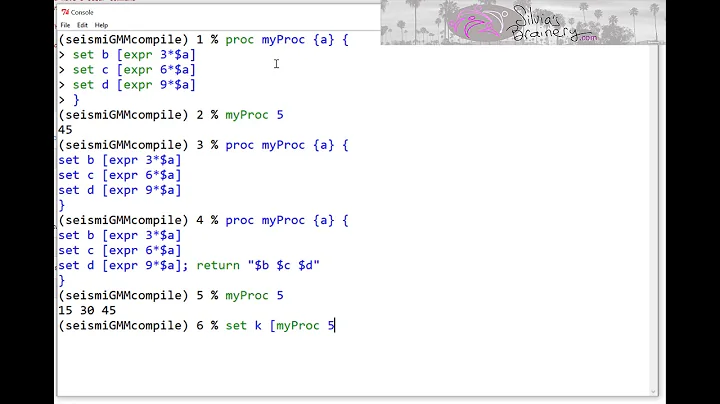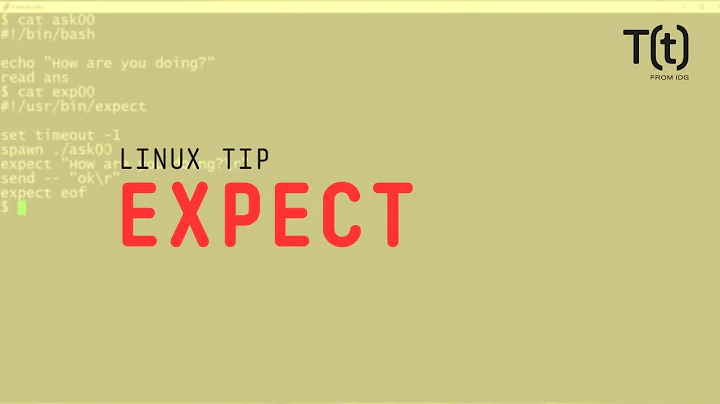Save terminal output to variable in expect/tcl
5,952
To automate the iteration, you can do this:
#!/usr/bin/expect
spawn ./offset_fitm_exp
set range 1.6
set azimuth 1.0
while {true} {
expect "enter minimum cross-correlation threshold:"
send "0.15\r"
expect "enter the range and azimuth error thresholds:"
send "$range $azimuth\r"
expect -re {range: ([0-9.]+) azimuth: ([0-9.]+} {
set range $expect_out(1,string)
set azimuth $expect_out(2,string)
}
expect "set new error bounds? (0: no, 1: yes):" {
if {$range > 0.02 || $azimuth > 0.02} {
send "1\r"
} else {
send "0\r"
break
}
}
}
interact
Related videos on Youtube
Author by
Piotr De
Updated on September 18, 2022Comments
-
Piotr De over 1 year
Hej all, I have to use an interactive program and I want to automatize it with expect. My experiences in Linux and scripting is not the best. So this is the program output:
enter minimum cross-correlation threshold: 0.15 enter the range and azimuth error thresholds: 1.6 1.0 range, azimuth error thresholds: 1.60000 1.00000 cross-correlation threshold: 0.15000 * * * model fit std. dev. (samples) range: 0.5298 azimuth: 0.4166 set new error bounds? (0: no, 1: yes): 0The first two lines and the last one are interactive. So with expect and send it was not a problem to enter the thresholds for one time. But I want to iterate this process. Therefore I have to save the results "range: 0.5298 azimuth: 0.4166" into two variables and then run again until I get good results e.g. "range: 0.02 azimuth: 0.02".
Anyone have an idea how I can store the results, compare them, and iterate the process?
That works:
#!/usr/bin/expect spawn ./offset_fitm_exp expect "enter minimum cross-correlation threshold:" { send "0.15\r" } expect "enter the range and azimuth error thresholds:" { send "1.6 1.0\r" } expect "set new error bounds? (0: no, 1: yes):" { send "0\r" } interactThanks for your help! Bjoern
-
 kos over 8 yearsCan you add what you have already? The answer will probably need to be integrated deeply with it.
kos over 8 yearsCan you add what you have already? The answer will probably need to be integrated deeply with it. -
 j0h over 8 yearsis the zero after the "):" a default output, or did you put that in?
j0h over 8 yearsis the zero after the "):" a default output, or did you put that in? -
Piotr De over 8 yearsI added the code now. I put it in
-
 j0h over 8 yearswait... are you hitting enter at each one of those lines? I thought that was program output. one potential problem i see is that ":" is used in places besides the prompt.
j0h over 8 yearswait... are you hitting enter at each one of those lines? I thought that was program output. one potential problem i see is that ":" is used in places besides the prompt. -
Piotr De over 8 yearsNo, not at each line. I only hit enter after I put the values in (lines 1,2 and 10)
-
 j0h over 8 yearsDo you have source code for the program? (thinking that might be significantly easier to make the automation happen)
j0h over 8 yearsDo you have source code for the program? (thinking that might be significantly easier to make the automation happen) -
Piotr De over 8 yearsunfortunately not
-
fiatux over 8 yearsThis question is more relevant for Stack Overflow, not askubuntu
-
![Automate Remote SSH Control of Computers with Expect Scripts [Tutorial]](https://i.ytimg.com/vi/Vt5S12U3F0k/hq720.jpg?sqp=-oaymwEcCNAFEJQDSFXyq4qpAw4IARUAAIhCGAFwAcABBg==&rs=AOn4CLB1dIvarZp_0SNCZYOm_GPYc9fBlw)





